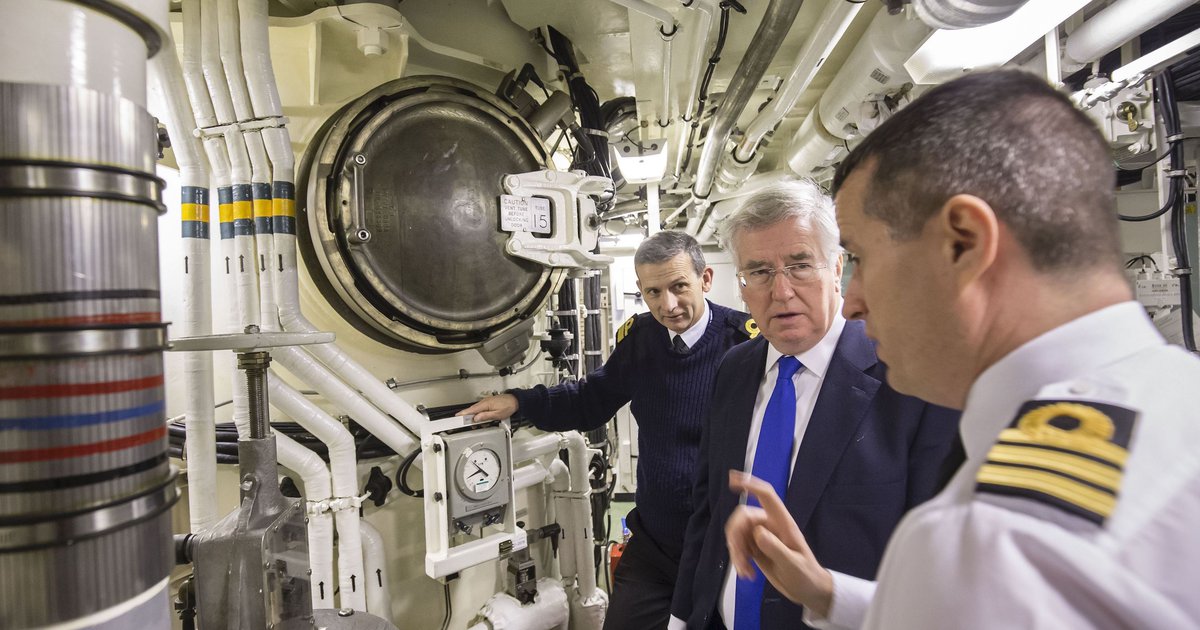Nicola Sturgeon recently made an impassioned statement in the Guardian for the moral case against nuclear weapons and their positioning in Scotland. I was Executive Officer (second in command) of a Polaris submarine based in Scotland in the early 1970s. I support her stand and can add some observations of my own from my unique perspective.
Long in retirement, I followed the 2016 Parliamentary debate on whether to renew the current Trident submarines with interest. It seemed largely to consist of patriotic polemic in support of an extremely expensive programme, the impact of which on the Royal Navy’s budget has reduced the number of frigates below critical mass. Furthermore, it did not address any of the issues of how and when Trident might be used, referring only to ‘Last Resort’. I was particularly struck by the then Prime Minister’s (PM) assertion that she would “press the nuclear button.” While the PM makes the decision to fire, it is the captain on patrol who tuns the ‘Captain’s Key’ and says “You have my permission to fire”.
Current UK Trident policy
In my day we had a simple choice – if the Soviets fired nuclear weapons at us would we fire back? Answer – Yes. Today, the policy for Trident is much more complex and could include a pre-emptive (first use) strike to support troops in the field threatened, say, with biological weapons. The Government indicated this in a Minister’s statement prior to the 2003 Iraq War and still states that it has “ neither a ‘first use’ nor a ‘no first use’ policy”. Therefore first use remains an option. This significantly lowers the nuclear threshold, and has profound implications for the captain.
The US is expanding its first use options to include low-yield warheads. The UK may well come under pressure to support and emulate this because the UK relies extremely heavily upon US technical support and political goodwill. An independent cross party report in 2014 stated, “… If the United States were to withdraw their cooperation completely, the UK nuclear capability would probably have a life expectancy measured in months.”
Since 1994, UK missiles have not been allocated targets, and the submarine itself has been at ‘several days’ notice to fire’. It is therefore no longer in a position to protect against the ‘bolt from the blue’ attack as we were in the Cold War at 15 minutes notice to fire. This calls into question the enormous expenditure on maintaining Trident patrols 24/7.
Is a policy of First Use lawful?
Although the Prime Minister makes the decision to fire, it is actually the Trident captain who has the ultimate responsibility of deciding if turning his ‘Captain’s Key’ is justified and lawful under military and international law.
The 1949 Geneva Conventions established international rules for limiting the barbarity of war, and Additional Protocol 1 (AP1) was added to them in 1977 to protect civilians. The 1996 International Court of Justice (ICJ) Advisory Opinion on the threat or use of nuclear weapons reaffirmed these, as did the 1998 statute establishing the International Criminal Court (ICC).
Because nuclear weapons are inherently uncontrollable, indiscriminate, long lasting and disproportionate in their effect, the captain needs to know the targets, the effect of his weapons on them and their effect on civilians. However, he will be dived, maintaining radio silence to avoid detection and so almost certainly unaware of this. A policy that includes firing one or more warheads of varying strengths as a pre-emptive strike (first use) at a ‘Rogue State’ in case it might be about to carry out an existential attack on UK forces and/or the homeland, significantly complicates the captain’s decision. Why and who is he firing his warheads at? And is it lawful?
The Government has sought to provide legal cover for the captain by exempting the UK from the constraints of these rules. For example, on ratifying AP1 in 1998, the Government attached a ‘Reservation’ asserting that the rules apply only to conventional weapons. While it is true that AP1 does not proscribe weapons by name, this does not alter the fact that any weapons, including nuclear, could contravene the Conventions. Also, the ICJ could not come to a definitive conclusion in 1996 regarding the legality of using nuclear weapons when a State’s existence was threatened. The UK positively claims this means it would be lawful; which is not quite what they said and, in ICJ opinion, in other circumstances would generally be unlawful.
The captain relies on these tenuous interpretations and on the Attorney General’s advice to the PM. But, remembering Iraq and The Chilcott Report, can he reliably do so? Especially as Nuremberg Principle IV states that obedience to a superior’s order “does not relieve him of responsibility …provided a moral choice was in fact possible”. Moreover, the ICC Statute confirms that he could be guilty of a war crime if he obeys a “manifestly unlawful” order.
The situation will become further complicated because of the UN Treaty on the Prohibition of Nuclear Weapons. 34 of the 50 States required to bring it into force are parties to it and 21 more are in process of becoming so. This will place the UK – and its Trident captains – under considerable political, legal and moral pressure.
I therefore suggest that the UK Government should commit itself to press for multi-lateral nuclear disarmament as a priority and, meanwhile, at least abrogate first use in the same way that China has committed itself to do, in a recent letter to the United Nations.
PrintRobert Forsyth | Radio Free (2019-12-16T08:58:06+00:00) It is the Trident submarine captain, not the UK PM, who “presses the button”. Retrieved from https://www.radiofree.org/2019/12/16/it-is-the-trident-submarine-captain-not-the-uk-pm-who-presses-the-button/
Please log in to upload a file.
There are no updates yet.
Click the Upload button above to add an update.
